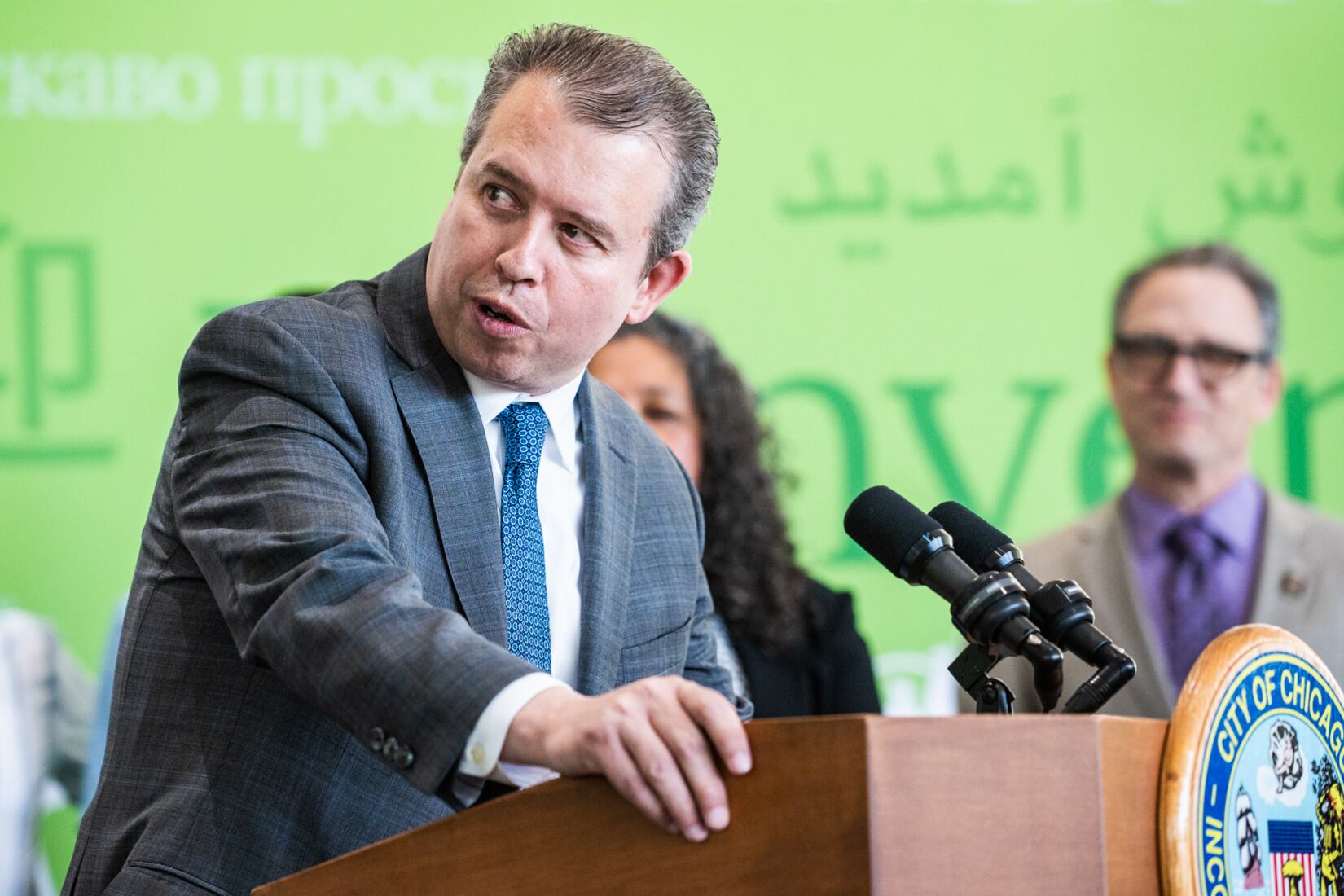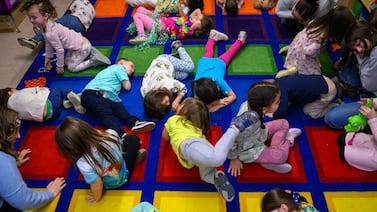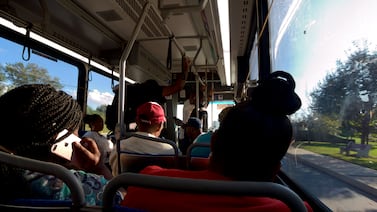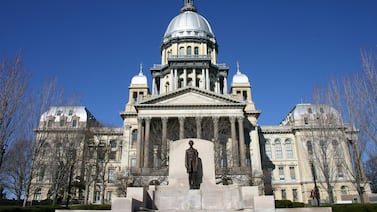Sign up for Chalkbeat Chicago’s free daily newsletter to keep up with the latest education news.
The Chicago Board of Education is slated to vote on a resolution that commits to no school closures until 2027 — a response to a Chicago Teachers Union assertion that CEO Pedro Martinez is planning closures, which he has staunchly denied.
The vote on the resolution, which Mayor Brandon Johnson’s appointed school board will consider at its Thursday meeting, comes days after Johnson asked Martinez to resign. In an op-ed for Chicago Tribune published Tuesday, Martinez said he will not step down — and described the talk of closures as a tactic aimed at undermining him.
The resolution is worded as a recommendation from Martinez that the board will be asked to approve. But in the Tribune piece, Martinez said both he and Board President Jianan Shi are asking the board to approve the resolution. In a letter to staff and families, Martinez said the resolution has the board’s “enthusiastic support.”
Asked Tuesday night if Shi partnered with Martinez on the resolution, Shi – in his first public comments since news of Johnson’s resignation request — said Martinez proposed it. Asked if he would vote to approve it, Shi said, “As a former organizer, educator, I have no intention of closing schools.”
If passed by the board, the resolution would place a moratorium on school closures until the end of the 2026-27 school year. Currently, state law prevents Chicago from closing schools until Jan. 15, 2025, when the city’s new, partially elected school board will be sworn in.
In an email, Mary Ann Fergus, a spokesperson for Chicago Public Schools, said the resolution is binding, “but, of course, it could be reversed by future Boards.”
In his letter to staff and families, Martinez wrote that the resolution was an effort to “put to rest” what he described as a “misinformation campaign.”
“I’m disappointed that this misinformation campaign is out there, because I know it has caused unnecessary stress and worry for many in our school communities,” Martinez wrote.
Johnson’s request for Martinez’s resignation raised questions over whether the school board might move to fire Martinez at Thursday’s meeting. On Tuesday evening, a CPS spokesperson initially sent reporters a statement purporting to be from the district and the board that said there was no plan to take action on the CEO’s contract or to secure a loan at the meeting. The statement also said that “there have been an unfortunate series of rumors aimed at discrediting CEO Martinez and his leadership team,” and that any reference to school closures “is a tactic to provide more chaos and uncertainty, to steal precious time away from delivering a world-class education to our children.”
Soon after, Shi tweeted that he hadn’t seen the statement before it went out, and told Chalkbeat that the statement “caught me off guard. This was not a Board of Education statement.”
Minutes later, the district spokesperson sent out an email saying the earlier statement was incorrectly labeled and came from CPS only.
Shi declined to say whether he agreed with the statement and wouldn’t comment on Johnson’s request for Martinez to resign, saying he cannot discuss personnel issues.
Martinez’s reassurance fail to sway union leaders
School closures are a political third rail in Chicago, where in 2013, former Mayor Rahm Emanuel’s decision to close 50 schools is still painful for many Chicago residents.
Last week, the union said it had obtained a school facilities analysis that included a list of 70 schools that could be consolidated with 70 others. Citing this document, the union’s House of Delegates passed a vote of no confidence in Martinez.
Martinez has said he would not close schools during his tenure as head of CPS. In a letter last week to staff, Martinez said the school board requested the analysis, and that the district conducted it to help create a five-year strategic plan, which places more focus on bolstering neighborhood schools. Martinez has said the analysis led the board and CPS officials to decide that closures were unnecessary.
Despite Martinez’s assurances over the past week and the planned resolution, union leaders continued to press the issue of possible closures at a public bargaining session at Cameron Elementary on the West Side Tuesday evening.
The session was focused on the union’s demand to expand the number of campuses participating in the Sustainable Community Schools program, a joint district-union initiative that gives extra funding to schools to enlist community nonprofits, beef up after-school programs, and strengthen parent engagement, among other things.
The school district has offered to expand the program from 20 campuses now to 45 within four years, a more modest expansion than the union and Johnson’s administration have sought.
At the session, union Vice President Jackson Potter held up a list of schools flagged for possible consolidation as part of the facilities analysis. He noted that some Sustainable Community Schools are on the list, and questioned whether efforts to transform them could be moot if they end up shuttered down the road.
Bogdana Chkoumbova, the district’s chief education officer, again categorically denied that officials are eyeing closures.
“This referenced list was never made as a recommendation nor was it ever considered as a next step or follow up by anyone,” she said, “There never was a plan to close schools.”
CTU President Stacy Davis Gates countered that staff vacancies and large class sizes in some schools were undermining them, potentially setting them up for closure down the road.
“I am looking at the schools on the list and seeing how they’ve been starved for resources,” she said.
Gates and Potter pressed officials on possible staffing cuts to help balance the district’s almost $10 billion budget, which did not include any dollars for teacher and principal contract costs when the school board passed it earlier this summer.
District officials acknowledged that staffing shortages continue to be an issue. But they argued the district — which added 6,000 positions, including about 2,500 teachers, in the past four years — is on the right track.
“The bottom line is that there are more qualified educators in CPS than at any point before,” said Ben Felton, the chief talent officer.
He said there is no plan to lay off district employees midyear, though he did not rule out the need for such cuts later as enrollments shift.
Budget issue creates rift between mayor and Martinez
Tensions between the mayor and CPS became clear after Johnson told reporters that he was unhappy with the CPS budget, which had a slew of cuts to close its deficit.
Johnson’s desire to oust Martinez came after Martinez and the board declined to cover a chunk of pension payments for non-teaching staff, a move that helped widen a city budget deficit.
When the Johnson administration pushed CPS to take out a short-term loan to help pay for the pension costs, as well as the costs of new teachers and principals union contracts, Martinez and the board balked.
In an internal memo obtained by Chalkbeat, CPS leadership said taking out such a loan would be fiscally irresponsible, could result in a further downgrade of its bond ratings, and would worsen the district’s long-term debt. Martinez publicly confirmed those concerns in his Tribune op-ed.
During the bargaining session, district and union officials joined in praising the community schools model and professing a desire to expand it. But at a press conference afterwards, Davis Gates again took aim at Martinez, calling him a “clown show CEO” standing in the way of a mayor, teachers union and school board in agreement about pumping more dollars into schools and transforming them.
“He can just sign on the dotted line and then we can work together to win more funding for our schools,” she said.
CPS officials canceled their press conference.
In a statement Tuesday, City Hall spokesperson Ronnie Reese did not directly address the resolution.
“As an organizer, Mayor Johnson fought against school closures and participated in a hunger strike to save neighborhood schools,” Reese said. “His vision for public education in Chicago calls for investments in our students — not layoffs and harmful school actions that have traumatized families and communities across the city.”
Reema Amin is a reporter covering Chicago Public Schools. Contact Reema at ramin@chalkbeat.org.
Mila Koumpilova is a reporter covering Chicago Public Schools. Contact Mila at mkoumpilova@chalkbeat.org.







